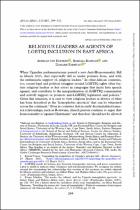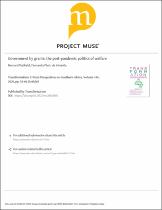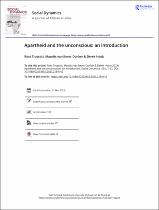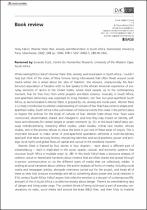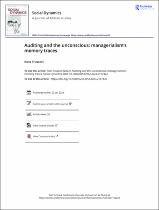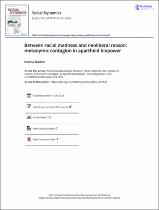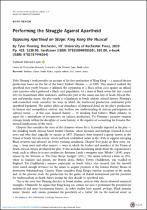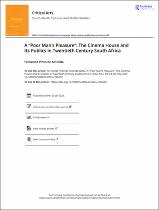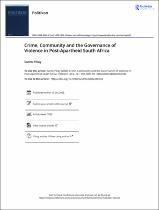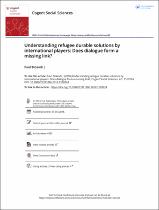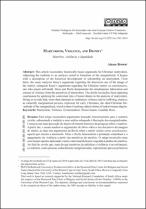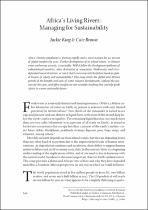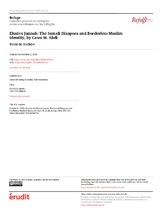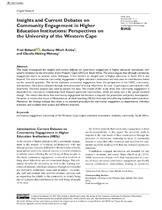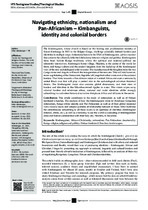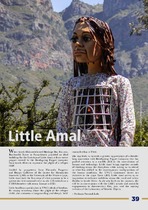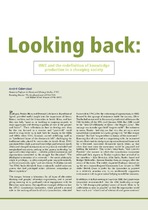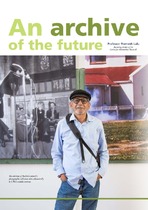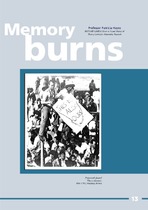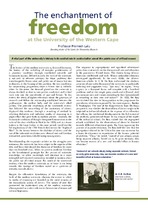Centre for Humanities Research
Browse by
Since its inception in 2006, the Centre for Humanities Research (CHR) at the University of the Western Cape has emerged as a crucial meeting point for researchers in the Humanities and Social Sciences throughout Southern Africa. The Centre strives to develop unifying and interdisciplinary themes in the humanities that will enable a renewal of its study in Africa.
Collections in this community
Recent Submissions
-
Religious leaders as agents of Lgbtiq inclusion in east Africa
(Oxford University Press, 2023)When Ugandan parliamentarians passed a new Anti-Homosexuality Bill in March 2023, they reportedly did so under pressure from, and with the enthusiastic support of, religious leaders.1 In other African countries, too, recent ... -
Government by grants: The post-pandemic politics of welfare
(Johns Hopkins University Press, 2020)In April 2020, with South Africa in national lockdown, president Cyril Ramaphosa announced the Covid-19 relief program on a scale he called ‘historic’. He affirmed that the state would not only reestablish the economy but ... -
Apartheid and the unconscious: An introduction
(Taylor and Francis Group, 2023)This special issue invited contributors to revisit J.M. Coetzee’s “The Mind of Apartheid,” first published in Social Dynamics in 1991. Here, Coetzee asks what it might mean to come to terms with apartheid:It is not ... -
Worrier state: Risk, anxiety and moral panic in South Africa
(SAGE Publications, 2023)While reading Nicky Falkof’s Worrier State: Risk, anxiety, and moral panic in South Africa, I couldn’t help but think of the video of Nina Simone being interviewed that often floats around social media where she is asked ... -
Auditing and the unconscious: Managerialism’s memory traces
(Taylor and Francis Group, 2023)This paper takes J.M. Coetzee’s “The Mind of Apartheid” as a point of departure in thinking about audits in universities. Using the psychoanalytic framing of apartheid that Coetzee puts in place, audit is likened here ... -
Between racial madness and neoliberal reason: Metonymic contagion in apartheid biopower
(Taylor and Francis Group, 2023)I will seek to consider the simultaneous workings of race and capital in apartheid biopower. J.M. Coetzee offers a reading of apartheid racism as racial madness which is imbricated with economic reason. In the wake of the ... -
Performing the struggle against apartheid opposing apartheid on stage: King Kong the musical
(Cambridge University Press, 2023)Tyler Fleming’s book provides an account of the first production of ‘King Kong’ — a musical theatre production based on the life of the boxer Ezekiel Dlamini — in 1959. This musical rankled the apartheid state partly ... -
A “poor man’s pleasure”: The cinema house and its publics in twentieth century South Africa
(Taylor and Francis Group, 2023)What do cinema houses have to tell us about the experience ofcollective leisure in early twentieth-century South Africa? Thisarticle considers how the cinema house points to unprecedentedsocial conditions that allowed the ... -
Crime, community and the governance of violence in post-apartheid South Africa
(Taylor and Francis Group, 2008)The South African government has embarked on a programme ofencouraging social cohesion in South Africa first to address concerns stemmingfrom high levels of violent crime which characterise the society, and second, ... -
Understanding refugee durable solutions by international players: Does dialogue form a missing link?
(Taylor and Francis Group, 2018)This study evaluates durable solutions in relation to refugees from EastAfrica. It particularly focuses on the Great Lakes countries of Rwanda, Burundi,Democratic Republic of Congo and Uganda. The study is based on the ... -
Martyrdom, violence, and dignity
(Escola Superior Teologia, 2019)This article reconsiders historically based arguments for Christian martyrdom, subjecting the tradition to an analysis suited to liberation of the marginalized. It begins with a description of the historical development ... -
Africa’s living rivers: Managing for sustainability
(MIT Press, 2021)Africa’s human population is growing rapidly and is set to account for 40 percent of global numbers by 2100. Further development of its inland waters, to enhance water and energy security, is inevitable. Will it follow ... -
Elusive Jannah: The Somali diaspora and borderless Muslim identity, by Cawo M. Abdi
(York University Libraries, 2018)Overall, Belonging and Transnational Refugee Settlement should be applauded for emphasizing the need to recognize the complexity of refugee lives, and to rethink the dominant assumptions that so often render refugees ... -
Insights and current debates on community engagement in higher education institutions: Perspectives on the University of the Western Cape
(SAGE Publications, 2021)This study investigated the insights and current debates on community engagement in higher education institutions with specific reference to the University of the Western Cape (UWC) in South Africa. The article argues ... -
Navigating ethnicity, nationalism and Pan-Africanism – Kimbanguists, identity and colonial borders
(AOSIS, 2021)The Kimbanguists, whose church is based on the healing and proclamation ministry of Simon Kimbangu in 1921 in the Belgian Congo, challenge colonially defined borders and identities in multiple ways. Anticolonialism is ... -
Little Amal
(José Frantz, 2020)When South Africa celebrated Heritage Day this year, Boschendal Estate in Franschhoek provided an ideal backdrop for the first steps of Little Amal, a three-metre puppet created by the Handspring Puppet Company from South ... -
Looking back
(José Frantz, 2020)Professors Patricia Hayes and Premesh Lalu have in this edition of Signals provided useful insight into the importance of theory, history, archives and the humanities in South Africa, and how they can help “assist us in ... -
An archive of the future
(José Frantz, 2020)The University of the Western Cape (UWC) recently entered into a partnership with photographer Rashid Lombard to house his substantial archival collection, which promises to offer expanded perspectives on the everyday ... -
Memory burns
(José Frantz, 2020)Among the photograph collections at Mayibuye, especially from IDAF, are numerous contact sheets. The contact sheet was part of the toolkit of the photographer in the time of analogue photography. The contact sheet is ... -
The enchantment of freedom at University of the Western Cape
(José Frantz, 2020)The history of the modern university is ,first and foremost ,the history of the unfolding of complex problematics of a planetary condition through established scientific and humanistic inquiry. Defined as such, the work ...

